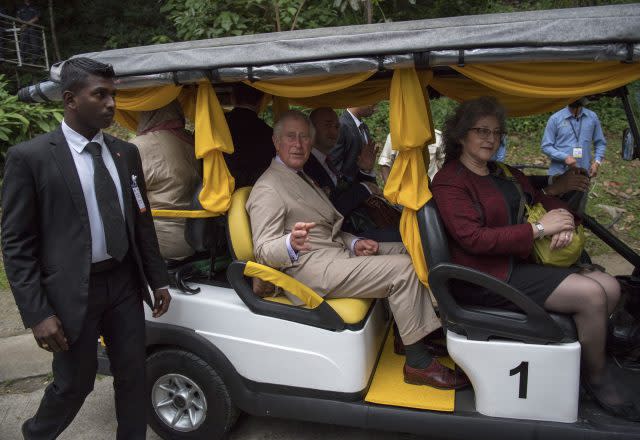Anti-poaching project backed by Charles's charity announced at wildlife summit

British forces will train Malaysians in anti-poaching techniques to help protect endangered wildlife species like the tiger, the UK's High Commissioner to the country has announced.
The counter-poaching specialists - who have worked in Africa - will next year teach groups like rangers how to track down poachers over great distances and long periods of time.
Stunning views of #Malaysia from above as The Prince travels to Belum to attend a conservation summit with the Sultan of Perak #RoyalVisitMYpic.twitter.com/PIDVofSwKP
-- Clarence House (@ClarenceHouse) November 4, 2017
The Prince of Wales's charitable body supported the project financially when it was in its infancy and Charles attended a conservation summit in Malaysia where High Commissioner Vicki Treadell made the announcement.
Support for the initiative has also come from the Duke of Cambridge's wildlife conservation charity, Tusk Trust, which William supports closely as royal patron, and has given funds to the scheme.
Read Tusk's Royal Patron, HRH The Duke of Cambridge, speech from the fantastic #TuskBall@KensingtonRoyalhttps://t.co/hOd14HiaJkpic.twitter.com/eAFDO6T3BA
-- Tusk (@tusk_org) November 4, 2017
Charles had the chance to see the sort of habitat Malayan tigers live in when he was taken on a boat trip in the Royal Belum State Park, in northern Malaysia, where the conference was held.
Wearing a life jacket over his cream suit, the Prince's boat, also carrying his entourage, sped over rainforest-fringed Lake Temenggor for 45 minutes.
Following a @WWF Conservation Summit, HRH enjoys a narrated boat tour around Temenggor Lake, hearing about the area's wildlife #RoyalVisitMYpic.twitter.com/Fe3sVwZ6Km
-- Clarence House (@ClarenceHouse) November 4, 2017
Speaking briefly at the end of the summit, Ms Treadell told delegates: "I'm pleased to announce, albeit a small sum, we have identified an initial £30,000 or 165,000 ringgit - depending on the rate of exchange - to develop some capacity building programmes working across Malaysia."
She added: "The other commitment that we will make today is that we will bring British military anti-poaching training expertise to Malaysia next year to run some training of anti-poaching.

"Of course we will do it here in Belum but we also hope to take it to other parts of Malaysia. That is our commitment to take the work that flows from this summit forward."
The numbers of Malayan tigers have fallen by around half to just 250 animals during an 11-year period to 2014 - but global figures for the big cats have increased by 700, from 2010-16, to 3,900.


